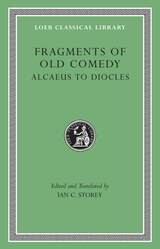
Laughter in stitches.
The era of Old Comedy (ca. 485 – ca. 380 BC), when theatrical comedy was created and established, is best known through the extant plays of Aristophanes, but there were many other poets whose comedies survive only in fragments. This new Loeb edition, the most extensive selection of the fragments available in English, presents the work of more than fifty-five poets, including Cratinus and Eupolis, the other members (along with Aristophanes) of the canonical Old Comic triad.
For each poet and play there is an introduction, and for many there are brief notes and recent bibliography. Also included are a selection of ancient testimonia to Old Comedy, nearly one hundred unattributed fragments (both book and papyri), and descriptions of thirty vase paintings illustrating Old Comic scenes. The texts are based on the monumental edition of Kassel and Austin, updated to reflect the latest scholarship. The complete Loeb Fragments of Old Comedy is in three volumes.
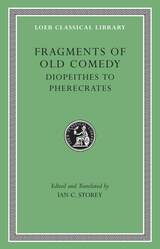
Laughter in stitches.
The era of Old Comedy (ca. 485 – ca. 380 BC), when theatrical comedy was created and established, is best known through the extant plays of Aristophanes, but there were many other poets whose comedies survive only in fragments. This new Loeb edition, the most extensive selection of the fragments available in English, presents the work of more than fifty-five poets, including Cratinus and Eupolis, the other members (along with Aristophanes) of the canonical Old Comic triad.
For each poet and play there is an introduction, and for many there are brief notes and recent bibliography. Also included are a selection of ancient testimonia to Old Comedy, nearly one hundred unattributed fragments (both book and papyri), and descriptions of thirty vase paintings illustrating Old Comic scenes. The texts are based on the monumental edition of Kassel and Austin, updated to reflect the latest scholarship. The complete Loeb Fragments of Old Comedy is in three volumes.
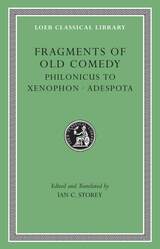
Laughter in stitches.
The era of Old Comedy (ca. 485 – ca. 380 BC), when theatrical comedy was created and established, is best known through the extant plays of Aristophanes, but there were many other poets whose comedies survive only in fragments. This new Loeb edition, the most extensive selection of the fragments available in English, presents the work of more than fifty-five poets, including Cratinus and Eupolis, the other members (along with Aristophanes) of the canonical Old Comic triad.
For each poet and play there is an introduction, and for many there are brief notes and recent bibliography. Also included are a selection of ancient testimonia to Old Comedy, nearly one hundred unattributed fragments (both book and papyri), and descriptions of thirty vase paintings illustrating Old Comic scenes. The texts are based on the monumental edition of Kassel and Austin, updated to reflect the latest scholarship. The complete Loeb Fragments of Old Comedy is in three volumes.
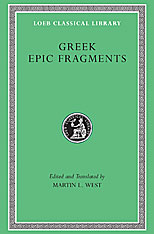
Cyclic verse.
Greek epics of the archaic period include poems that narrate a particular heroic episode or series of episodes and poems that recount the long-term history of families or peoples. They are an important source of mythological record. Here is a new text and translation of the examples of this poetry that have come down to us.
The heroic epic is represented by poems about Heracles and Theseus, and by two great epic cycles: the Theban Cycle, which tells of the failed assault on Thebes by the Seven and the subsequent successful assault by their sons; and the Trojan Cycle, which includes Cypria, Little Iliad, and The Sack of Ilion. Among the genealogical epics are poems in which Eumelus creates a prehistory for Corinth and Asius creates one for Samos. In presenting the extant fragments of these early epic poems, Martin West provides very helpful notes. His Introduction places the epics in historical context.
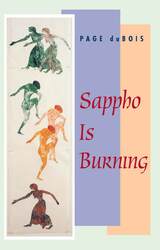
In Sappho is Burning, duBois reads Sappho as a disruptive figure at the very origin of our story of Western civilization. Sappho is beyond contemporary categories, inhabiting a space outside of reductively linear accounts of our common history. She is a woman, but also an aristocrat, a Greek, but one turned toward Asia, a poet who writes as a philosopher before philosophy, a writer who speaks of sexuality that can be identified neither with Michel Foucault's account of Greek sexuality, nor with many versions of contemporary lesbian sexuality. She is named as the tenth muse, yet the nine books of her poetry survive only in fragments. She disorients, troubles, undoes many certitudes in the history of poetry, the history of philosophy, the history of sexuality. DuBois argues that we need to read Sappho again.
READERS
Browse our collection.
PUBLISHERS
See BiblioVault's publisher services.
STUDENT SERVICES
Files for college accessibility offices.
UChicago Accessibility Resources
home | accessibility | search | about | contact us
BiblioVault ® 2001 - 2024
The University of Chicago Press









